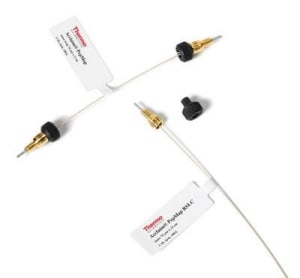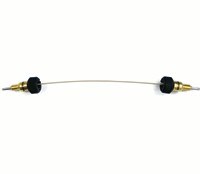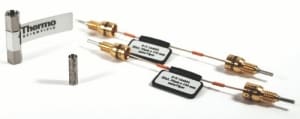PepMap Columns
The standard for Peptide Separations in Proteomics

Thermo Scientific™Acclaim™ PepMap™ and Acclaim™ PepMap™ RSLC columns are specially designed for high-resolution analyses of tryptic, natural, and synthetic peptides. The columns are often applied for LC-MS/MS peptide mapping for protein identification, biomarker discovery, and systems biology. Due to their high loading capacity, the columns are exceptionally suitable for the analysis of low abundant peptides in complex proteomics samples.
PepMap columns are available in separation (analytical) and trap formats.
Key features & benefits
- High resolution protein identification for biomarker discovery, verification or any other analysis
- Highest sensitivity in LC-MS
- Higher throughput due to higher loading pressure
- Thermo Scientific™ nanoViper™ fingertight connections for easy column installation
PepMap columns employ nanoViper zero-dead-volume (ZDV) fingertight connections that eliminate the assembly of PEEK sleeve connections making it far easier to achieve state-of-the-art nanospray performance and are capable of withstanding pressures up to 1200 bar.

Separation columns come in diameters for nano (50 and 75 μm), capillary (300 μm) and micro (1000 μm) LC. Different lengths are available from 5cm for high throughput with short micro columns to 75 cm long nano columns for high peak capacity and sensitivity.

The Acclaim® PepMap100 Nano-Trap columns are available in 100 μm and 200 μm i.d. fused silica, and are packed with 5 μm particle size and 300 Å pore size.
The nano trap design features a single capillary with the trap column at the end and is ideal for high resolution separation of relatively clean samples or samples with hydrophilic peptides.
The cartridge based trap columns have a wider ID and are ideal for large sample amounts or when sample quality demands more robustness.

Acclaim® PepMap™ μ-Precolumns are very short microcolumns–available in 5 and 15 mm lengths–consisting of a cartridge holder and a set of disposable cartridges. μ-Precolumns are used for sample pre-concentration, sample cleanup, or in various column-switching techniques.
